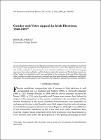| dc.contributor.author | O'Kelly, Michael | |
| dc.date.accessioned | 2011-10-18T13:51:47Z | |
| dc.date.available | 2011-10-18T13:51:47Z | |
| dc.date.issued | 2000 | |
| dc.identifier.citation | O'Kelly, Michael. 'Gender and voter appeal in Irish elections, 1948-1997'. - Economic & Social Review, Vol. 31, No. 3, July, 2000, pp. 249-265, Dublin: Economic & Social Research Institute | |
| dc.identifier.issn | 0012-9984 | |
| dc.identifier.other | JEL D72 | |
| dc.identifier.other | JEL Z13 | |
| dc.identifier.uri | http://hdl.handle.net/2262/60179 | |
| dc.description.abstract | In general elections in the Republic of Ireland 1948-1997, female candidates have received on average a lower proportion of first-preference votes than males. This disparity between male and female candidates is worsening over time. Female candidates have less electoral campaign experience than male candidates, and this helps to explain the gender gap. The declining importance of the ?widow?s (or daughter?s) seat? may contribute to the worsening of the gap. When these and other variables are taken into account, a residual voter bias against female candidates is statistically significant only among supporters of Fianna Fail; PD supporters actually favour female candidates. | en |
| dc.language.iso | en | |
| dc.publisher | Economic & Social Studies | |
| dc.relation.ispartof | Vol.XX, No. XX, Issue, Year | |
| dc.source | Economic & Social Review | en |
| dc.subject | Psephology | en |
| dc.subject | Gender | en |
| dc.subject | Ireland | en |
| dc.subject | Elections | en |
| dc.subject | Quantitative methods | en |
| dc.subject | Voting | en |
| dc.title | Gender and voter appeal in Irish elections, 1948-1997 | |
| dc.type | Journal Article | |
| dc.publisher.place | Dublin | en |




